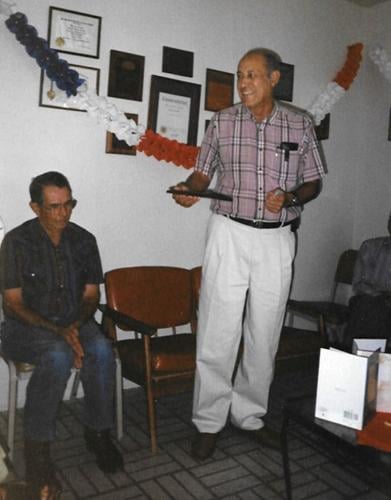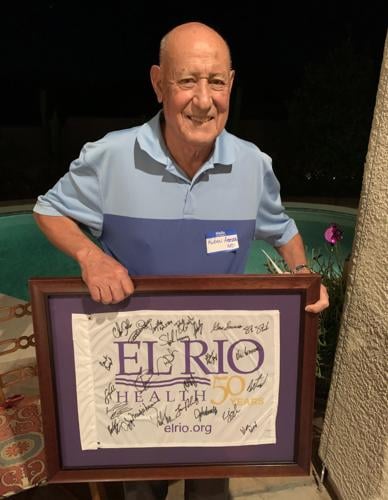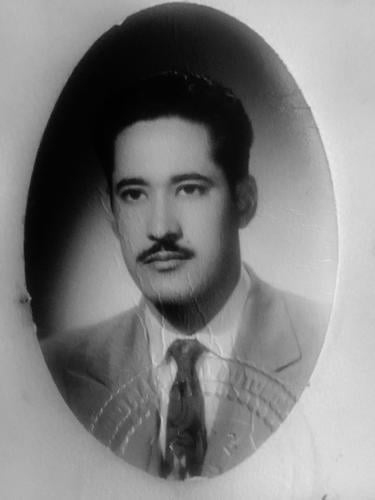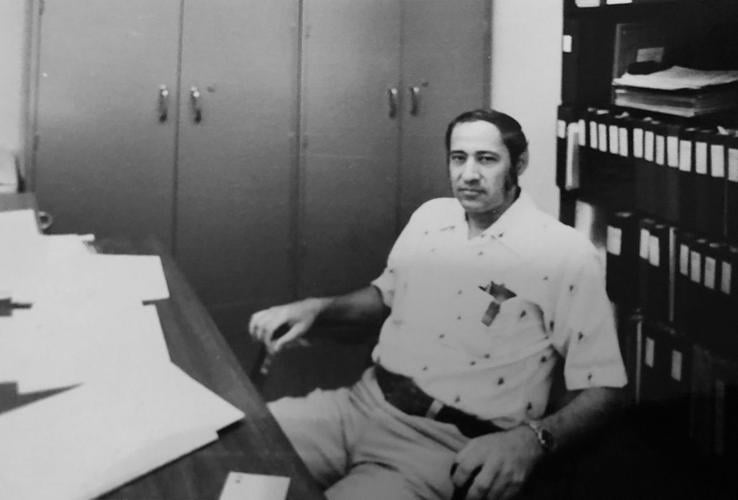Dr. Ruben Acosta, who opened a private practice on Tucson’s south side in the 1970s to serve the Hispanic community and later became a surgeon for the then-El Rio Santa Cruz Neighborhood Health Center, died of COVID-19 on Dec. 13. He was 89.
Acosta was healthy with no underlying health conditions but became ill on Dec. 5 with a fever and cough, said Irene Acosta, his wife of 42 years. She said she drove him to Oro Valley Hospital and he was released the following morning to recuperate at home because his lungs were clear.
Five days later, Acosta returned to the hospital as his cough worsened and his fever remained. On Dec. 13, he was taken to the intensive-care unit, recalled his wife, explaining that his family was not allowed to be with him.
“He did not want to be placed on a ventilator and had a do-not-resuscitate order. He was sent to hospice care at the hospital, and his nurse was so kind and was able to have all of us — his children and grandchildren say goodbye through FaceTime,” said Irene.
“He was my prince. I am going to miss him. He was not conscious when we said our goodbyes, but we hope that he heard us,” said Irene, who was caring for him at home and since twice tested negative for the virus. “All of this is a nightmare. I am not living in reality yet. I still think he will be coming home from the hospital,” she said through tears.
In an act to remember the lives lost to the Coronavirus disease (COVID-19), the Cathedral of Saint Augustine's bell rang for 30 minutes just after noon, on Dec. 30, 2020. In a media advisory released on Tuesday (Dec. 29), The Archdiocese of New York announced their churches would be ringing bells the following day to remember the 335,000 lives lost to COVID-19 pandemic in the United States. Many other diocese and religious institutions followed suit in taking part including the Diocese of Tucson. The bell that rang in Tucson's Cathedral of Saint Augustine is the only remaining physical bell in the church and is used for funerals. It rang for 30 minutes just after noon. (Josh Galemore / Arizona Daily Star)
His daughter, Melissa Acosta, said her father “loved helping people and knowing he could make a difference. He was selfless and after retirement he volunteered at Peppi’s House, a hospice at Tucson Medical Center. He taught me kindness and compassion for others. He loved to read fiction, nonfiction and history, and he passed his love of reading to me and his grandchildren,” said Melissa, a former city public defender who is now working for the Pascua Yaqui Tribe.
Brenda Goldsmith, director of the El Rio Foundation, said many are in shock about Ruben Acosta’s death. “He was so healthy and we just honored him at a 50th anniversary celebration of the health center in October. He was a beautiful person who was a passionate doctor. He wanted to make sure all had access to medical care. That is his legacy, and it lives on with others like him who are called to serve,” said Goldsmith. Acosta, who was an avid golfer, was honored with a framed golf flag signed by PGA players in the 2020 Cologuard Classic.
Acosta was born Nov. 4, 1931, in Chihuahua City, Chihuahua in Mexico. His father worked as a carpenter and barber to provide for his family of five children, and he supported Ruben in his medical studies at Universidad Autónoma de Mexico in Mexico City. He graduated in 1957 with a medical degree and came to the United States for further training, serving an internship in vascular and general surgery at Methodist Hospital in Peoria, Illinois. He worked at Columbia Hospital in Milwaukee, Wisconsin, where he met his first wife, Mary Lucas. They fell in love and married before returning to private practice in Chihuahua City in 1963.
Two years later he moved to Tucson and became a U.S. naturalized citizen in 1968, and received further surgical training at the VA hospital on South Sixth Avenue. He and Mary, who died of cancer in 1975, had two children.
In the late 1960s, Acosta opened up his private practice in Tucson’s midtown before moving it to the south side on South 12th Avenue, near Irvington Road.
Acosta specialized in vascular and general surgery and while treating Hispanic families in an area that lacked medical care, he spoke to Dr. Herb Abrams, a founder of El Rio Santa Cruz Neighborhood Health Center, which is now El Rio Health with more than a dozen clinics in Tucson, about he and three other surgeons offering their services to El Rio patients. The doctors performed numerous surgeries pro bono at Tucson hospitals and partnered with St. Mary’s Hospital, where Acosta was chief of staff from 1979 to 1981.
Acosta closed his private practice in 1998 and was contracted by the state to care for prisoners until 2004. He retired from active practice at age 75 in 2007 after 39 years of service. He bought property in Oracle and enjoyed the family gatherings at his three-acre “ranch,” said Irene.
He was a founding member of The Centurions, a charitable organization of St. Mary’s Hospital, a former chairman of the Arizona Board of Medical Examiners, former president of the Tucson Surgical Society and member of the American Medical Association, Arizona Medical Society and Pima Medical Society. He also served as executive director of the Tucson Human Relations Commission.
In addition to his wife and daughter, Melissa, Acosta is survived by three other children, three stepchildren and 14 grandchildren.
A celebration of life for Acosta is expected in November 2021, permitting the virus is under control. The family asks that donations be made in Acosta’s name to the El Rio Foundation online at elrio.org/donate or a check to the foundation can be mailed to 839 W. Congress St., Tucson, AZ 85745.
Photos: Rain and snow around Tucson
Snow
Updated
Sophia Flores takes belly slides down a strip of snow covered ice on the road just above Ski Valley in the very upper reaches of the Santa Catalinas, Tucson, Ariz., December 29, 2020.
Snow
Updated
Sightseers ride the lifts at Ski Valley to get a look as the scattered and patchy snow that fell in the very upper reaches of the Santa Catalina Mountains, Tucson, Ariz., December 29, 2020.
Snow
Updated
People stop to get photos of the clouds moving through the area from Windy Point in the Santa Catalina Mountains, Tucson, Ariz., December 29, 2020.
Snow
Updated
Frost covers the needles of the pine trees just under the towers on Mount Bigelow in the wake of a winter storm that dropped snow and freezing rain in the upper elevations of the Santa Catalinas, Tucson, Ariz., December 29, 2020.
Snow
Updated
A spot of sunlights finds a snow dappled ridge on the north side of the Santa Catalina Mountains that marks the line of the summer's Bighorn Fire, Tucson, Ariz., December 29, 2020.
Snow
Updated
The rime drops off the needles of a pine as the sun finally breaks through on the snow and ice in the very upper reaches of the Santa Catalina Mountains, Tucson, Ariz., December 29, 2020.
Tucson Weather
Updated
Tucson from Sentinel Peak as clouds roll through Pima County on Dec. 29, 2020.
Tucson Weather
Updated
Downtown Tucson from the westside as clouds roll through the area on Dec. 29, 2020.
Tucson weather
Updated
A cyclist pushes up Mt. Lemmon Highway near the Babad Do'ag Trailhead, on Dec. 29, 2020.
Rainbow, Pima Canyon
Updated
A rainbow bursts forth from the cold mist in Pima Canyon in the Santa Catalina Mountains during spotty rain on Dec. 29, 2020.







